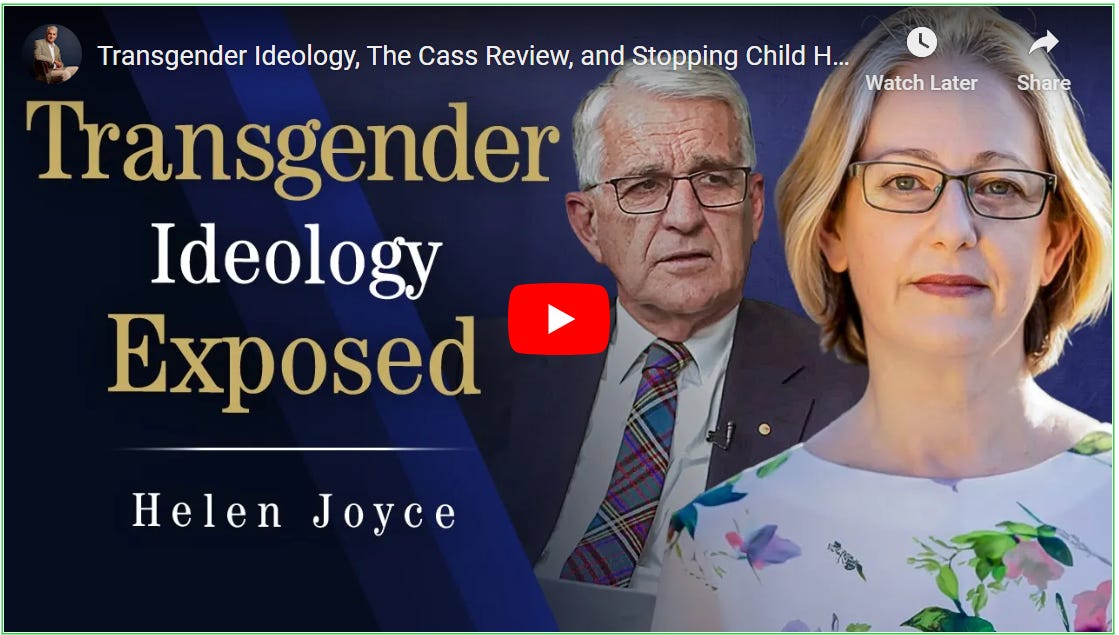A round-up of recent conversations
What I’ve been talking about in interviews post-Cass
The past few weeks I’ve recorded several podcasts with hosts in several countries. As always, I found the conversations enjoyable and clarifying. Always something new comes up, no matter how many I do. For this post I thought I’d share a few of them (one has not yet come out), with some reflections.
If you are not a subscriber to my weekly newsletter, you might like to sign up for free updates. I hope that in the future you might consider subscribing.
In the order I recorded them (not the order they appeared), the first was The shape of dialogue, a New Zealand podcast that publishes infrequently. The host, Michael Goldwater, was extremely knowledgeable about the issues, and is also fiercely pro free speech and rationalist; he hosted Richard Dawkins’ recent tour to New Zealand. It’s just come out today.
The next day I recorded an audio-only conversation with John McGuirk and Sarah Ryan of Gript, an upstart Irish website that covers the news that mainstream outlets don’t.
Gript is conservative and Catholic, and so comes at life and politics from a very different angle than me. But it has done some old-fashioned shoe-leather reporting and general holding of power to account, of the sort that has fallen out of favour in mainstream Irish outlets. John told me how he receives emails from women thanking him for covering gender issues ignored elsewhere – and sometimes they’ll say “I used to hate you, sorry.” And it was great to hear Sarah, who has young kids, express righteous rage about what is being taught in Irish schools – an Irish mammy is not someone to go up against lightly.
The next day it was a conversation with John Anderson, a former deputy prime minister of Australia.
It was during this recording that I started to realise how angry I feel with the people who misled gender-distressed children and their families about the efficacy and safety of puberty-blockers; now that the NHS has sharply reined in prescribing, the children who have been on waiting lists, convinced that these drugs would be their salvation, are doubtless extremely distressed. Nobody who truly cared about the mental health and wellbeing of these children would ever have talked so lightly about the risks of suicide among this cohort. But then, no one who truly cared would have peddled puberty-blockers as a panacea in the first place either.
It’s not Hilary Cass’s fault that these children now feel desperate – what was she supposed to say: the doctors have been prescribing something they shouldn’t have for more than a decade so now it’s too late to stop them? But I’m sure that at least some young people and their families are blaming her, not the snake-oil merchants who misled them in the first place.
And finally, the following week, I spoke with political theorist Yascha Mounk, whom I’ve known slightly for some years. Yascha has the distinction of having published Keira Bell’s first-person story on his Substack newsletter, Persuasion, just over two years ago. This was really brave, and I’m so happy that Yascha is returning to the topic with renewed vigour post-Cass. The podcast is due to drop on Saturday 11th May; here’s a link to the show site. I’ll provide a link in the next newsletter.
Post-publication edit: here it is.
Persuasion aims to reduce polarisation and find common ground on even the trickiest topics, and that was Yascha’s theme through the conversation for his podcast, The Good Fight. I didn’t think the particular compromises he suggests are workable, and explained why – but as always a pleasure to talk to someone who hasn’t been steeped in this topic, and who can come at it afresh.
So, a nice mixture: a free-speech campaigner who’s well-versed on gender issues; a conservative Catholic outlet that does better reporting on issues affecting gay men and lesbian women than any mainstream Irish outlet; an Australian podcast with a very wide reach and a political theorist committed to old-fashioned liberal values seeking to talk across America’s political divide. If anything good comes out of this mess, it’ll be the way it has ripped up all the old certainties and got thoughtful, altruistic people talking to each other across differences again.
I’m also so grateful to finally be talking to people outside the gender bubble – although of course still very grateful to the people who listened right from the start. When my book came out my in-laws said that what I was describing couldn’t seriously be happening, because if it was it would have been on the BBC. So it was nice to hear from an Australian friend that her dad finally takes seriously what she’s been going on for years, now that he’s heard it on John Anderson’s show. The mainstream news blackout has made it so difficult to be believed.
If you are signed up for free updates or were forwarded this edition of Joyce Activated, and you would like to subscribe, click below.


